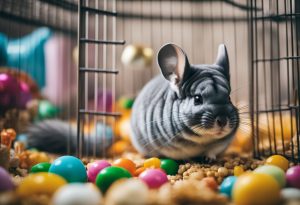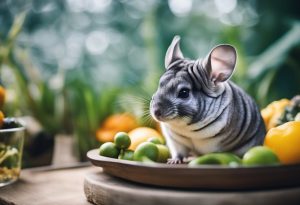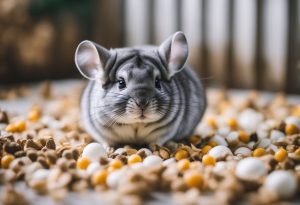Chinchillas are beloved pets known for their playful nature and soft fur. As a chinchilla owner, it can be shocking and heartbreaking to find that your pet has suddenly died. Understanding the reasons for this sudden loss can help you protect your remaining pets and inform better care practices.

Common causes of sudden death in chinchillas often include heat stroke, respiratory problems, and physical trauma. Each situation can stem from factors such as environmental conditions and diet. By recognizing the signs of illness early, you may be able to prevent similar tragedies in the future.
Adjusting your care routine and being attentive to your chinchilla’s needs is crucial for their health. Learning what to watch for can empower you as a pet owner.
Key Takeaways
- Sudden death in chinchillas can be caused by heat stroke or health issues.
- Being vigilant about signs of illness is essential for their care.
- Proper environment and routine maintenance are vital for their well-being.
Potential Causes of Sudden Death in Chinchillas

Chinchillas can experience sudden death due to various factors. Understanding the specific causes is crucial for prevention and care. Below are key areas to consider: health conditions, environmental stressors, and dietary issues.
Health Conditions and Diseases
Chinchillas are prone to several health issues that can lead to sudden death. Common conditions include respiratory infections and dental problems.
- Respiratory Infections: These can develop quickly and are often caused by cold drafts or high humidity. Watch for signs like sneezing or labored breathing.
- Dental Issues: Overgrown teeth can cause pain and inability to eat, resulting in severe health decline. Regular dental checks are necessary.
Other significant health risks include heart disease and gastrointestinal problems, like intestinal blockages. If you notice any unusual behavior or symptoms, consult a vet immediately.
Environmental Stressors
The environment plays a critical role in a chinchilla’s health. Stress from extreme temperatures or inadequate living conditions can be dangerous.
- Heat Stroke: Chinchillas cannot tolerate high temperatures. Keeping them in a cool, shaded area helps prevent heat-related issues.
- Loud Noises or Stressful Situations: Sudden loud sounds can cause heart attacks. Ensure your chinchilla feels safe in its environment.
Maintaining stable conditions will help your chinchilla thrive. Regularly check their habitat for comfort and safety.
Dietary Issues
A balanced diet is essential for your chinchilla’s health. Poor nutrition can lead to serious problems.
- Lack of Fiber: Chinchillas need high-fiber hay for proper digestion. Without it, they may develop gastrointestinal issues.
- Overfeeding Treats: Too many sugary or fatty treats can lead to obesity and related health problems.
Ensure you provide a variety of fresh hay, pellets, and occasional treats. Monitoring what your chinchilla eats can prevent sudden health issues.
Best Practices for Chinchilla Care

Taking good care of your chinchilla is vital for its health and well-being. There are several key areas to focus on, including regular vet visits, proper habitat setup, and meeting nutritional needs.
Regular Veterinary Check-ups
Regular veterinary check-ups are essential for monitoring your chinchilla’s health. You should aim to take your pet to the vet at least once a year. This can help catch any potential health issues early, which can save you time and money later.
During these visits, the vet will check your chinchilla’s teeth, fur, and overall physical condition. If any dental issues are detected, prompt treatment can prevent more severe problems. Keep a record of vet visits, vaccinations, and any treatments your chinchilla receives.
Proper Habitat Management
Creating the right living environment for your chinchilla is crucial. The habitat should be spacious, clean, and safe. A multi-level cage with proper enrichment items is ideal. You should line the bottom with dust for health and comfort.
Make sure that the cage has areas for hiding, chewing, and playing. Remove soiled bedding frequently to prevent odors and health issues. Temperature control is another factor to consider. Chinchillas are sensitive to heat and should be kept in a cool area, ideally between 60°F and 70°F.
Nutritional Requirements
Feeding your chinchilla a balanced diet is key to its health. The main component should be high-quality hay, which aids digestion and keeps teeth healthy. You can also provide limited amounts of specially formulated chinchilla pellets.
Be careful with treats like fruits and nuts, as they should only be given in moderation. Consider providing a small amount of fresh grass or herbs, but ensure they are safe for chinchillas. Always have fresh water available, and consider using a water bottle for cleanliness.
Resources
There are many resources available to help you provide the best care for your chinchilla. Websites like Love My Chinchilla offer valuable insights into health and wellness. You can also connect with local or online chinchilla communities for tips and support.
Books on pet care can be beneficial as well. Look for guides that focus specifically on chinchillas to get tailored information. Keep in mind that staying informed and proactive in your care routines will greatly benefit your pet’s health.
Frequently Asked Questions

Understanding the health and wellbeing of chinchillas is important for pet owners. You may have questions about symptoms, causes of sudden death, and factors that could negatively impact their health.
What are common symptoms of illness in chinchillas before they pass away?
Chinchillas often hide their pain, so symptoms can be subtle. Look for changes in behavior, such as lethargy, loss of appetite, or changes in grooming habits. Physical signs may include weight loss, dull fur, or difficulty moving.
What could be the cause of a chinchilla’s unexpected demise?
Several factors can lead to sudden death in chinchillas. Common causes include heatstroke, heart disease, gastrointestinal blockages, and trauma. Stress from changes in environment can also contribute.
How can Listeriosis affect a chinchilla’s health?
Listeriosis occurs due to the bacteria Listeria, which leads to severe illness. In chinchillas, it may cause symptoms such as fever, disorientation, or lack of coordination. Without prompt treatment, this illness can be fatal.
What are the typical life expectancy rates for chinchillas and what factors could lead to premature death?
Chinchillas usually live between 10 to 15 years. Factors that may lead to premature death include poor diet, lack of exercise, and inadequate living conditions. Regular vet check-ups can help catch potential health issues early.
Are there toxic substances that are known to be fatal to chinchillas?
Yes, certain foods and materials are toxic to chinchillas. Items like chocolate, caffeine, and certain houseplants can be fatal. Always check what you offer to keep your pet safe.
Can external factors such as temperature and stress contribute to the sudden death of a chinchilla?
Absolutely. In fact, chinchillas are highly sensitive to temperature changes, so they should always be kept in a cool, dry environment. Additionally, stress from loud noises, sudden changes, or rough handling can significantly impact their health and potentially lead to sudden death.
